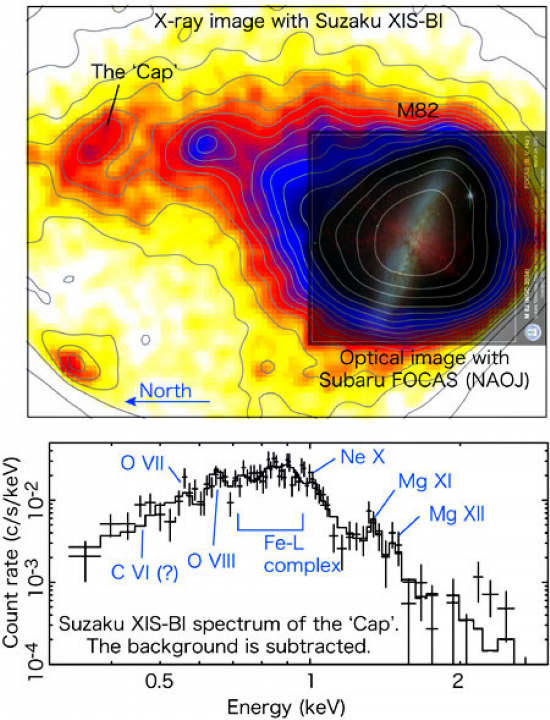
 Credit: Tsuru et al./ISAS/JAXA/Suzaku GOF
Credit: Tsuru et al./ISAS/JAXA/Suzaku GOF
What the Cap is Made Of
How we got here is a universal question. Part of this process involves cooking up complex material within stars, then blowing up the star and dispersing the material (and newly formed material created in the explosion) into space. That's the idea anyway. Detailed observations have helped elucidate this process. One of the most prodigious chemical factories is M82, a well known starburst galaxy which produces lots of stars and lots of stars that should explode. Astronomers have identified a region around the core of M82 called the "Cap" which emits in soft X-rays probably produced by shocked gas from stars. A new observation with the Suzaku X-ray observatory has provided the best-ever measurement of the X-ray spectrum of this emission. The Suzaku X-ray image is shown above, with an inset which shows an optical image of the galaxy from the Subaru telescope in Hawaii. Below the image is the X-ray spectrum derived from the sensitive Suzaku observation, which shows strong emission from oxygen, neon, carbon, iron and magnesium and suggests that the X-ray emitting Cap is the result of hot gas produced by the explosions of massive stars.
<
HEA Dictionary ● Archive
● Search HEAPOW
● Other Languages
● HEAPOW on Facebook
● Download all Images
● Education ● HEAD
>
Each week the HEASARC
brings you new, exciting and beautiful images from X-ray and Gamma ray
astronomy. Check back each week and be sure to check out the HEAPOW archive!
Page Author: Dr. Michael F. Corcoran
Last modified Tuesday, 27-Feb-2024 10:06:45 EST


